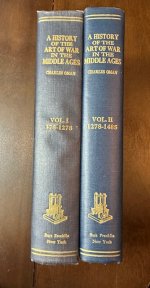I just finished
Ken Mondschein's 2017 book,
Game of Thrones and the Medieval Art of War.
As the title suggests, this book serves as a comparison between George R. R. Martin's famous series (both the books and the TV series, albeit more the former than the latter) and how things actually functioned during Europe's medieval period. Various chapters cover different topics, such as weapons and armor, war/duels/tournaments, economics, women, etc.
Unsurprisingly, the format here is more didactic than critical. While Mondschein never abandons the idea of critiquing Martin's work in terms of fidelity to history, he openly acknowledges that this is more about shedding light on how things actually were during the medieval period (as opposed to
medievalism, which is the pop culture take on various aspects of medieval life). In that regard, this book functions very well as an overall primer on medieval life, in that its disparate areas of coverage serve to give a wider view than what you'd find in a more specialized work, where each topic was the sole focus.
It helps that Mondschein is an engaging writer, having just enough verve (and the occasional aside) that the text never comes across as dry. That said, I found myself wishing on several occasions that he'd dialed it back just a touch, as his assertions can sometimes come across a touch too strongly.
This is most notable in the introduction; not only does his impassioned defense of the humanities (as college courses) seem somewhat misplaced (and his pointing to the culture wars of today makes that justification seem petty rather than pressing; far better is his unfortunately-abbreviated acknowledgment that the humanities (as far as this book's area of study goes) should be taught simply because people remain taken with the medieval period, and want to learn more about it), but I find myself grimacing whenever anyone makes a declarative assertion that they are one of the world's foremost experts on something. While Mondschein does proceed to back that assertion up by listing his credentials and experiences, it still comes across as bordering on arrogance, and I suspect that some readers will find it off-putting.
If so, that's a shame, because he knows what he's talking about, and presents it well. Frequent citations to classical works sit alongside excerpts from Martin's books, and this is one of those all-too-rare instances when something is both educational and entertaining at the same time. Of course, fans of Martin's will be pleased that Mondschein vindicates the ASOIAF series in virtually every category in which he examines it. Perhaps the only area where Martin's work doesn't measure up is the chapter on atrocities, where, for instance, the sack of the Saltpans (from
A Storm of Swords) is shown to be mild compared to what happened during the
Jacquerie.
Overall, I'd recommend this to anyone who's a fan of medieval history, especially if they've read/watched the GoT/ASOIAF series.




